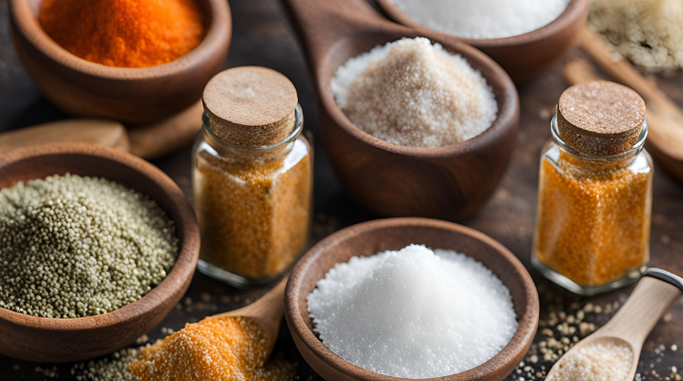Seasoned salt is a blend of salt combined with herbs, spices, and sometimes other ingredients like garlic, onion powder, and paprika. Unlike regular table salt, which is purely sodium chloride, seasoned salt offers a more complex flavor profile. It’s often used as an all-purpose seasoning to elevate the flavor of a wide variety of foods, including meats, vegetables, pasta, and even popcorn.
The great thing about seasoned salt is its versatility. It provides the saltiness you need to bring out the flavors in food, while the added herbs and spices add depth and richness. Seasoned salt is a pantry staple in many kitchens due to its ability to enhance and complement a broad range of dishes.
What Makes Seasoned Salt Different from Regular Salt?
While regular salt, such as table salt or sea salt, is simply used to add saltiness to food, seasoned salt is a blend that enhances the flavor of the dish as a whole. Seasoned salt can be thought of as an upgraded version of salt because it includes a mix of flavors that can enhance the natural taste of food without needing to add multiple individual spices.
Some common ingredients found in seasoned salt include:
- Garlic Powder
- Onion Powder
- Paprika or Cayenne Pepper (for a bit of heat)
- Dried Herbs like thyme, rosemary, or parsley
- Black Pepper
- Mustard Powder
- Lemon Zest or other citrus flavors
Essentially, seasoned salt brings the benefits of salt and seasoning into one product, making it easier to quickly season your food and add multiple layers of flavor at once.
Why Make Your Own Seasoned Salt?
While store-bought seasoned salts are convenient, making your own has several advantages:
-
Custom Flavor: When you make seasoned salt at home, you can tailor the flavor profile to suit your personal taste preferences. Want more garlic or a smoky touch of paprika? You can adjust the ratio of ingredients to create the perfect blend for your cooking style.
-
No Additives: Commercially produced seasoned salts may contain artificial additives, preservatives, or anti-caking agents. Homemade seasoned salt is free from these unnecessary chemicals, making it a healthier alternative.
-
Cost-Effective: Making your own seasoned salt can be more affordable in the long run. You can use common pantry ingredients you likely already have, and by making it in larger batches, you save money compared to constantly buying pre-mixed jars.
-
Personalization: You can get creative by incorporating unique spices or herbs that complement your cooking style, whether it's Mediterranean, Cajun, or more exotic flavors like curry or turmeric.
How to Make Seasoned Salt at Home
Making your own seasoned salt at home is incredibly simple, and the results are far superior to anything you'll find in a store. Below is a basic recipe for homemade seasoned salt, along with some variations you can experiment with.
Basic Seasoned Salt Recipe
Ingredients:
- 1/2 cup coarse salt (sea salt or kosher salt work well)
- 1 tablespoon garlic powder
- 1 tablespoon onion powder
- 1 teaspoon dried thyme
- 1/2 teaspoon black pepper
- 1 teaspoon paprika (smoked paprika for a deeper flavor, or regular paprika for a mild touch)
Instructions:
-
Combine Ingredients: In a small bowl, combine the salt with the garlic powder, onion powder, thyme, black pepper, and paprika. Stir until everything is well mixed.
-
Grind or Blend (Optional): If you want a finer texture, you can blend the mixture in a spice grinder or food processor. This is optional—leaving the mixture a bit coarse gives a more rustic feel and larger grains that can be sprinkled on food.
-
Store: Transfer the seasoned salt to an airtight container or a small jar. It will last for several months when stored in a cool, dry place. The flavors will continue to develop over time, so feel free to make a larger batch for future use.
Variations to Try
-
Smoky Seasoned Salt: Add 1/2 teaspoon of smoked paprika or liquid smoke to your mixture for a smoky, barbecue-style flavor. This is perfect for grilled meats or roasted vegetables.
-
Cajun Seasoned Salt: For a spicier, Southern-inspired version, add cayenne pepper, oregano, and celery salt. This variation is great on chicken, shrimp, and fried foods.
-
Herb-Infused Seasoned Salt: Add dried rosemary, oregano, and parsley to your salt for a Mediterranean-inspired flavor. This goes wonderfully with lamb, fish, or even pasta dishes.
-
Lemon or Citrus Seasoned Salt: For a bright, fresh twist, add the zest of 1 lemon or lime to your seasoned salt mix. The citrus can add an unexpected zing to seafood, salads, or roasted vegetables.
-
Chili Lime Seasoned Salt: Combine chili powder, lime zest, and salt for a tangy, spicy seasoning perfect for sprinkling on popcorn, avocado toast, or even fresh fruit.
-
Italian Seasoned Salt: Mix basil, oregano, thyme, and garlic powder with your salt for an Italian-inspired version. It’s fantastic on pasta, pizza, or grilled vegetables.
How to Use Seasoned Salt
Once you’ve made your homemade seasoned salt, the possibilities for use are endless. Here are some ideas on how to incorporate it into your cooking:
-
Seasoning Meats and Vegetables: Rub your seasoned salt onto meats like chicken, pork, or beef before grilling, roasting, or frying. The blend of herbs and spices will add a burst of flavor to your proteins, and it works wonderfully on roasted vegetables as well.
-
Popcorn and Snacks: Sprinkle seasoned salt over freshly popped popcorn or snack mixes for a flavorful alternative to regular salt. It’s also great on roasted nuts or chips.
-
Salads and Dressings: Use your seasoned salt as a base for salad dressings or vinaigrettes. The added herbs and spices will give a quick and easy boost to any salad.
-
Eggs and Breakfast Dishes: Sprinkle seasoned salt over scrambled eggs, omelets, or avocado toast for an added layer of flavor.
-
Soups and Sauces: Season your soups, stews, or sauces with seasoned salt to deepen the flavor profile. It can replace regular salt, adding a more complex taste to your dishes.
-
Finishing Touch: After your dish is cooked, sprinkle seasoned salt over the top as a finishing touch, especially on roasted vegetables, grilled meats, or even French fries.
Conclusion
Seasoned salt is a simple yet versatile ingredient that can quickly elevate the flavor of any dish. Making your own at home not only allows you to customize the flavor profile to your liking but also ensures you're using a healthier and more natural option compared to store-bought versions. Whether you’re adding a pinch of smoky seasoning to grilled meat or finishing off a salad, homemade seasoned salt is an easy way to enhance your cooking and add excitement to your meals.




